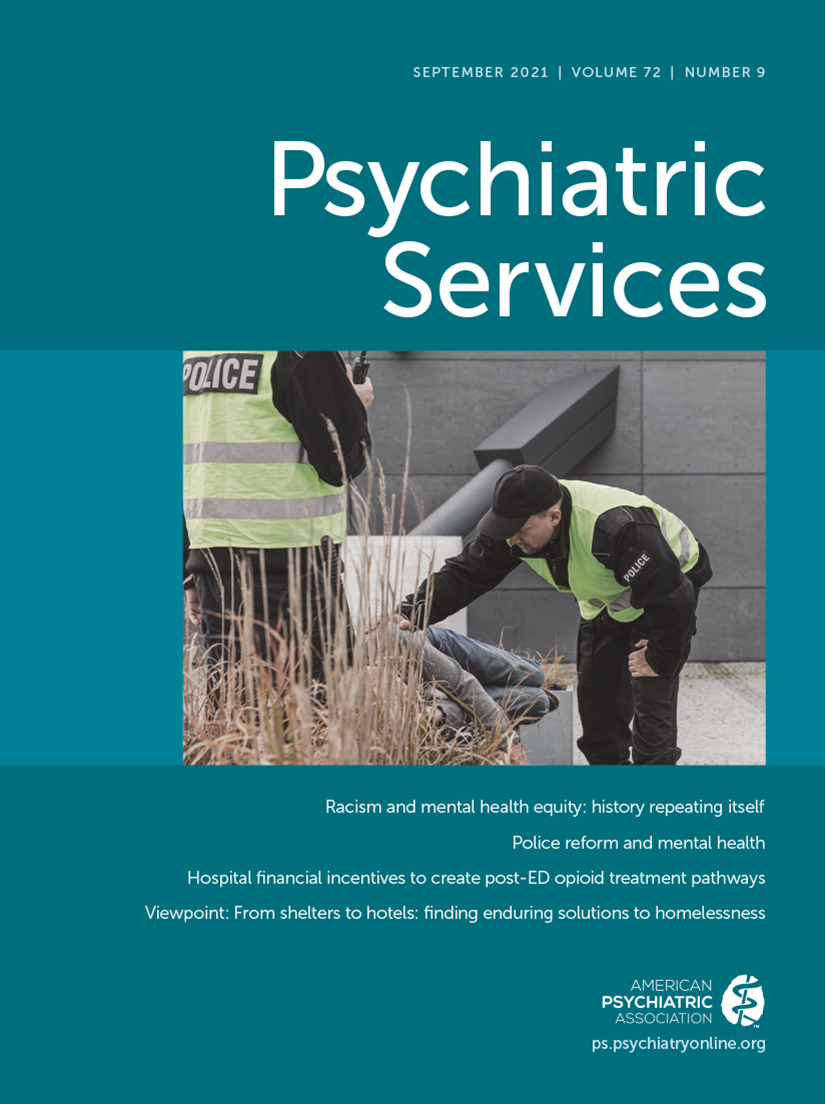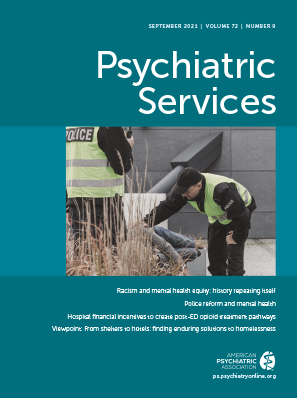Few would question that working and well-being are positively associated. Even when income is the primary reason for working, secondary gains from working contribute to overall well-being and improve mental and general medical health; foster meaning, purpose, and social belonging; and improve life satisfaction for individuals regardless of disability status (
1). Moreover, research consistently suggests that not working is associated with negative outcomes (
2,
3). Given this evidence, it seems reasonable to assume a positive association between employment and recovery for persons with psychiatric disabilities. In the United States, however, a troubling puzzle has emerged.
Research on supported employment has consistently shown that individual placement and support (IPS) is more effective than other employment support models in placing persons in competitive employment (
4,
5). Likewise, there has been consistently strong evidence that although IPS improves competitive employment outcomes relative to other supported employment approaches, it does not reduce reliance on disability benefits nor does it move people out of poverty (
5,
6). Evidence suggesting that IPS facilitates recovery or improves well-being, however, has been more equivocal (
7). Moreover, individuals who are engaged with supported employment or IPS work well below full-time, have relatively short job tenure, and work in low-wage, low-skill jobs that often reflect precarious employment and offer little to no job security (
7). The questions we are left asking, then, are ones with which Frederick and VanderWeele (
7) concluded their 2019 meta-analysis of supported employment and IPS: What is the ultimate purpose of supported employment or IPS, and is it worth the cost?
In this Open Forum, I suggest that IPS in its current conceptualization is tied to an individualistic economic-moral ethic of market competition, deregulation, and hyperbolized personal responsibility; that most low-wage employment is precarious and fails to promote class mobility; and that it may be time to ask why we do what we do.
Psychiatric Rehabilitation: Rhetoric and Reality
The IPS model of supported employment is an evidence-based approach for helping people diagnosed as having severe mental illness to gain competitive employment. Stripped of political context, however, the rhetoric of IPS becomes ethically ambiguous. IPS’s stated purpose is to improve a person’s functional quality of life and subjective well-being through competitive and integrated work, thereby recognizing the full dignity, choice, and interests of persons with psychiatric disabilities consistent with the values of psychiatric rehabilitation (
8); yet, these same values are put to use to legitimize minimal state investment in securing the welfare of vulnerable citizens (
9,
10). In this way, the progressive ethic of psychiatric rehabilitation is brought into sync with an economic-moral logic that valorizes personal responsibility and links dependency on publicly funded services to lower moral worth and social abjection (
10,
11).
In the United States, the dominant economic-moral logic postulates that human freedom and well-being are best maximized through economic freedom and personal responsibility and is marked by deep antipathy toward the welfare state (
11,
12). This logic has produced a profound concentration of wealth, growth of the nonstandard or gig economy, precarious employment, and financial insecurity (
1). These results are having profound negative effects on health, mental health, income equality, and social cohesion (
1,
11). It is this logic that has been laid bare by the first Assistant Secretary of the Labor Department’s Office of Disability Employment Policy, Roy Grizzard (
13).
Tying disability policy to the same ethic of personal responsibility inaugurated by the Reagan administration and continued in the Clinton administration’s 1996 welfare reform, Grizzard, in 2018, stated, “The key value on which the United States was founded was that of freedom. And one of the key definitions of freedom is: the right of enjoying all of the privileges of membership or citizenship. The best form of economic security, the best pathway to full citizenship, is employment” (
13). This value is part and parcel of the same economic-moral logic that is making life itself increasingly precarious for so many working individuals and has intensified barriers to improved well-being that employment is presumed to deliver. Rhetorically aligned with this logic, IPS promotes benefits of employment that are increasingly unavailable to working persons regardless of disability status. Thus, the rhetoric of IPS continues to portray an appealing picture of the relationships among employment, well-being, and recovery that may no longer match reality.
The 2021 State of Working
Work is a critical domain of well-being. As “agile learning” and constant “upskilling” become buzzwords of the new economy (
14), the belief that rapid job placement, placement before training, and competitive employment will have a significant impact on the lives of persons with psychiatric disabilities, particularly for persons with serious mental illness, may be misplaced. Is it possible that IPS is out of step with the changing demands of today’s labor force?
Over the past 40 years, the structure of work has changed. The number of U.S. workers who are independent contractors or are hired on a temporary basis is growing, as is participation in the nonstandard or gig economy (
15,
16). Competition for low-wage, low-skill jobs is increasing as globalization and technological changes continue to displace labor. Job losses from corporate restructuring, plant closures, and technological advances that substitute robotics for human labor have left workers anxious and insecure. These changes are producing widespread fear of downward mobility, and life itself is increasingly precarious, with work no longer promising ontological or existential security (
11). For millions of U.S. workers, the realities of employment provide little of what supported employment or IPS imagines for persons with psychiatric disabilities.
Despite the low cash amount of Supplemental Security Income (SSI) and Social Security Disability Insurance (SSDI) benefits, choosing not to work is a decision that makes intuitive sense. The cumulative value of SSI and SSDI, housing subsidies, primary health care, and social connection (even if through clinical or rehabilitation services) may provide substantial material and existential securities that are currently unavailable to many nondisabled workers in the United States. Moreover, the decision to remain on disability insurance is intuitively consistent with established patterns of decision making under risk observed in prospect theory (
17).
Prospect theory (
17) entails the well-replicated observation that individuals are motivated more by anticipated loss than by anticipated equivalent gains. Prospect theory begins with loss aversion, which is an asymmetric form of risk aversion, under which people make decisions on the basis of the potential gain or losses relative to their specific situation (the reference point) rather than on absolute terms (
18). Faced with a risky choice leading to possible gains, individuals are averse to risk, preferring solutions that lead to a lower expected utility but with a higher certainty (
18). In the case of persons receiving SSI or SSDI, if working offers few material gains, psychological benefits, or anticipated income security, the choice to continue receiving disability payments is powerfully motivated. It makes intuitive sense for people to maintain disability benefits even when employment opportunities are available. Indeed, the structure of SSI is such that asking people who receive disability benefits to give them up is asking them to make a choice that most nondisabled individuals would not make: if the anticipated value of working is not substantially greater than the loss—a value that accounts for secure income and may well exceed the cash amount—then it is not surprising that IPS is not having a large-scale impact on moving people away from reliance on disability benefits.
Is There a Better Way Forward?
Disability and poverty are in a dynamic relationship. Disability increases the risk for poverty, and the circumstances of poverty raise the risk for disability (
19). It is worth asking, then, if it is time to start asking deeper questions about the underlying motivations and logic of IPS, whether the outcomes achieved truly reflect what is needed for deeper change in service users’ lives and social standing, and whether and how we might approach vocational outcomes through a framework other than one focused primarily on rapid placement in typically low-wage jobs.
Returning to Frederick and VanderWeele’s questions posed at the beginning, if the success of IPS is based “merely” on the outcome of employment, but the employment delivers few secondary gains and provides no greater material or ontological security, then it might be worthwhile to consider what is driving our commitment to rapid job searches, placement before training, and the prioritizing of employment for the sake of employment itself.
Perhaps it is time to take up more critical considerations of the influences and interests that may be foreclosing other ways of thinking about what it might look like to work toward a system in which the security of living is sufficient to encourage the risk of working, and in which the risk of working is joined by real opportunities in education, job mobility, career planning, and financial savings. To think anew about how these purposes might be met, it may be time to examine the underlying logic and assumptions that underwrite the principles of IPS that operate, perhaps, in unacknowledged ways and beneath the surface of awareness.

